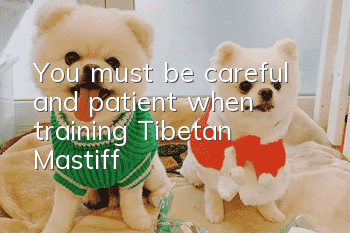You must be careful and patient when training Tibetan Mastiff

No matter what type of dog is being trained, no matter what type of dog it is, there will be naughty and mischievous dogs when they are young, so we must always be patient and train them, especially Tibetan Mastiffs, and be careful.
Tibetan Mastiff
The training of Tibetan Mastiff puppies mainly refers to the training of dogs aged 3-6 months. In fact, the training at this stage is the basis for the entire obedience training in the future. Fully understand all the basic knowledge about training, master this training method skillfully, and keep the block diagram of the entire training model in mind, and then train again, you can get twice the result with twice the result, and You will have a very comprehensive understanding of why it takes so much energy and time to train puppies. However, training such a small puppy requires a lot of patience. Training this kind of thing can be a lot of fun for puppies, but it is very different from playing with the dog at home.
Training the Tibetan Mastiff in a way that it can understand requires a lot of effort, and the training ideas must be clear. Throughout the training process, praise and encouragement must be used as much as possible, and criticism and negative correction must be avoided. Training a dog with extreme stubbornness, low mood, or other wrong ideas will only lead to failure in the final training. The dog must be allowed to learn easily and happily. Training Methods In fact, training puppies is a labor of love. When training, you must be patient, dedicated, and abide by the training rules. You must be energetic and dedicated. Do not train your dog when you are irritable or tired. You must train your dog when he is calm and happy. You cannot train it under stressful conditions. Once you feel stressed, you should stop training immediately and play with the Tibetan Mastiff for a while first. And don't scare your dog by being rude and unreasonable with an angry tone of voice. Be sure to remember not to pull or push the dog hard during training, and avoid using repetitive nagging language.
At the beginning of training, the dog may be absent-minded and uncooperative, but as long as you train it patiently, after a certain period of time, the dog will eventually cooperate. When training a very young puppy, you may only get a few things right at first, and you should feel satisfied. After the dog completes the training subjects, give it adequate rewards, and then rest for a period of time before continuing the training. It is important that the dog feels happy at the end of the training session. Training is an entertainment project. In order for the dog to have such awareness, the trainer must establish a very close friendship with the dog. When transitioning to a more difficult training subject, when ending the training of this subject, first let the dog do some subjects that it has mastered, and then the dog must be fully rewarded. Doing so will often receive praise and smiles from the trainer, which will help enhance the puppy's self-confidence. If the dog does well in the training subjects, it must be rewarded and don't be stingy.
Owners must be more careful when training Tibetan Mastiffs, especially the smaller Tibetan Mastiffs, which are quite naughty. Compared to training, it prefers to play, so owners may encounter many problems when training Tibetan Mastiffs. At this time, owners should not relax, continue to work hard, and insist on training the Tibetan Mastiff. As long as the method is correct, the Tibetan Mastiff can be successfully trained by the owners soon.
- Knowledge about dogs eating raw meat
- Should dogs eat and drink when they have a cold?
- The initial symptoms of a dog’s infectious disease are similar to those of a cold, so don’t misjudge it!
- How long is the lifespan of a Pekingese? What feeding taboos need to be noted?
- Dog miscarriage symptoms
- How should a Bichon Frize take care of her body after giving birth?
- What's going on with little Teddy foaming at the foam?
- Will Shih Tzu recognize a second owner?
- Can dogs eat lychee pulp?
- Can dogs eat pomegranate seeds?



